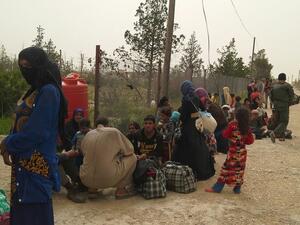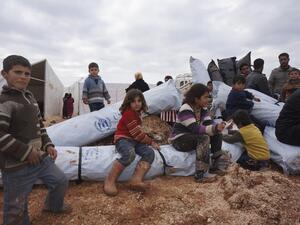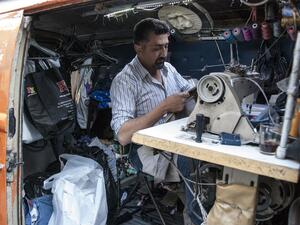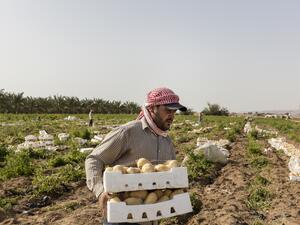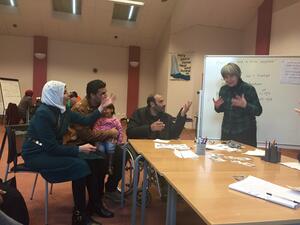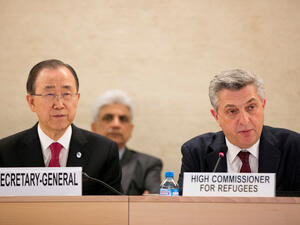Refugee total hits 3 million as Syrians flee growing insecurity and worsening conditions
Refugee total hits 3 million as Syrians flee growing insecurity and worsening conditions
Syria's intensifying refugee crisis will today surpass a record three million people, amid reports of increasingly horrifying conditions inside the country - cities where populations are surrounded, people are going hungry and civilians are being targeted or indiscriminately killed.
Almost half of all Syrians have now been forced to abandon their homes and flee for their lives. One in every eight Syrians has fled across the border, fully a million people more than a year ago. A further 6.5 million are displaced within Syria. Over half of those uprooted are children.
UNHCR and other aid agencies say increasing numbers of families are arriving in a shocking state, exhausted, scared and with their savings depleted. Most have been on the run for a year or more, fleeing from village to village before taking the final decision to leave.
There are worrying signs too that the journey out of Syria is becoming tougher, with many people forced to pay bribes at armed checkpoints proliferating along the borders. Refugees crossing the desert into eastern Jordan are being forced to pay smugglers hefty sums (ranging from $100 per person or more) to take them to safety.
The vast majority remain in countries neighboring Syria, with the highest concentrations in Lebanon (1.14 million), Jordan (608,000) and Turkey (815,000). In addition to the three million registered refugees, governments estimate hundreds of thousands more Syrians have sought sanctuary in their countries. This has led to an enormous strain on their economies, infrastructures and resources. More than four in five refugees are struggling to make a living in towns and cities outside of camps, with 38 per cent living in sub-standard shelter, according to a recent survey.
Syrians are now the world's largest refugee population under UNHCR care, second only in number to the decades-long Palestinian crisis. The Syria operation is now the largest in UNHCR's 64-year history.
"The Syrian crisis has become the biggest humanitarian emergency of our era, yet the world is failing to meet the needs of refugees and the countries hosting them," said António Guterres, the UN High Commissioner for Refugees.
"The response to the Syrian crisis has been generous, but the bitter truth is that it falls far short of what's needed," said Guterres.
A recent upsurge in fighting appears to be worsening an already desperate situation. As frontlines shift, new areas are emptying out. Recent arrivals to Jordan, for example, are running from attacks in the areas of Raqaa and Aleppo.
UNHCR is also deeply concerned for the wellbeing of several hundred Syrians trapped inside the Al Obaidy refugee camp in Al Qa'im, Iraq, after UN agencies and international NGOs were forced to abandon their offices and warehouses. UNHCR says national partners are continuing to provide supplies and maintenance, but the situation is volatile.
Many newly arriving refugees say they only left Syria as a last resort. A growing number, including more than half of those coming to Lebanon, have moved at least once before fleeing, and one in ten have moved more than three times. One woman told UNHCR she moved no fewer than 20 times before finally crossing into Lebanon.
In addition to worsening security, the latest refugees report increasing difficulty in finding work, skyrocketing food and commodity prices, and failing services. A packet of bread in one village near the city of Idlib costs ten times more this year than last, according to a new arrival in Jordan.
A growing share of recent arrivals - up to 15% in Jordan, for example - are suffering from long term medical conditions such as diabetes, heart disease and cancer, and left because they were no longer able to get adequate care at home.
UNHCR is working with 150 other agencies and groups, together with the governments of neighbouring countries, to help refugees pay the rent, and get food, education and medical care, as well as giving basic goods such as tents, mattresses and plastic sheeting.
In the past year alone, 1.7 million refugees received food aid, 350,000 children were enrolled in school, and shelter in camps was provided for more than 400,000 refugees. Since the beginning of the crisis in 2011, UNHCR has registered refugees faster than at any time in its history.
Donors have contributed more than USD 4.1 billion to successive regional response plans since 2012. However, more than 2 billion more is needed by the end of this year alone to meet the urgent needs of refugees. Most urgently, more than 2.4 million people are expected to need support in the coming weeks to prepare for next winter.
Additional Information (links may not function unless copied and pasted into a browser)
Data and other information on the Syrian refugee crisis can be found at http://data.unhcr.org/syrianrefugees/regional.php, which is updated daily.
Multimedia materials accompanying this press release, including video b-roll, photos, and infographics are available at http://www.unhcr.org/syria3million.
The following UNHCR spokespersons in Geneva and in countries neighbouring Syria are available in connection with this release (additional media contacts can be found at http://www.unhcr.org/4a09806215.html):
Geneva
- Melissa Fleming, mobile +41 79 557 9122
- Adrian Edwards, mobile +41 79 557 9120
- Dan McNorton, mobile: +41 79 217 3011
Beirut
- Dana Sleiman, mobile +961 71 910 626
- Bathoul Ahmed, mobile +962 790 224 281
Amman
- Helene Daubelcour, mobile +962 79 889 1307
Ankara
- Selin Unal, mobile +90 530 282 7862
Iraq
- Ned Colt, mobile +964 780 917 4173
Abu Dhabi
- Mohammed Abu Asaker, mobile +971 50 621 355


